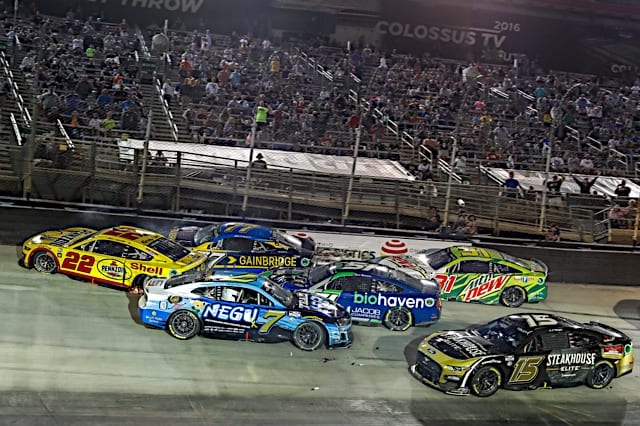One of the peculiar things from last weekend’s coverage of Talladega Superspeedway on FOX came in the way its NASCAR Cup Series broadcast ended. The race itself finished in a manner that has become customary for pack racing affairs, with a wreck on the last lap; this time near the finish line, with a lot of destroyed cars, and fingers crossed that no one injured themselves in a serious manner. Such chaos is the state of this type of racing.
But FOX, in the network’s need to move on to other programming, gave little time to truly cover the crash and check with all the drivers. Instead, it looked like showing the replays became what mattered while finishing order, safety, interviews or other helpful tidbits stood as trivial information left to be discovered elsewhere.
The important aspect for the sport is FOX got the footage needed to again sell NASCAR as a crash-filled, hyper-adrenaline, super-drama race where disaster can unfold at any moment. This framework is the tool for selling the product, the ever-necessary promotion machine. Such a construct is borne from the basics of the human condition.
Somewhere, buried deep in the reaches of our amygdala, the thirst for and comprehension of violence is intrinsic to our existence. Skipping through history, ignoring the Romans and the gladiators, brushing past the Middle Ages and jousting tournaments, we can look at the colonization of North America as tribute for bloodlust.
When the Puritans first settled on the continent, they attempted to live in a pious fashion and thought any work that did not serve to glorify God was deemed troubling and outlawed. However, in the South, with the more liberal influx of Scots-Irish settlers and the Dutch influence in what became New York, a different attitude prevailed that supported recreational activities. Following King James’ declaration in 1618 that activities could be permitted on Sundays, outside of church, the roots for sports and entertainment were born. Over time, they became a recognizable cultural influence.
The cultural practices of the time meant violence was inherent in the early forms of sports. One popular recreational event in North America was bull-baiting – when a bull would be tied up and a group of dogs would be set upon the bull. Two kinds of bets would accompany this form of entertainment: how many dogs it would take to subdue the bull or how many dogs could the bull kill.
In a similar fashion, bears would be used….
Click Here to Read the Full Original Article at …

